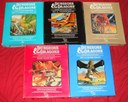Here are some snapshot photos from the RPG Research Project since 2004.
Sorted by Keyword Effect
RPG Research has been linking to Abantey's RPG workshop for years. Recently I stumbled across a short 7 minute documentary on their efforts to use role-playing games for educational and other benefits from a summer camp approach in California. Well worth checking out...
If you have a specialized area of knowledge or interest, or just excited about what we are trying to do, please consider joining the 100% volunteer, unpaid, open RPG Research community website. You help is crucial to helping provide your valuable research, community, or professional knowledge and experience to share with the international community in the hopes of helping "float all boats" and improve the world's understanding of role-playing games.
We are all about open, peer-shared, peer-learning, collaborative, community engaged sharing of information and experiences, and our primary website is open to all. We have also setup an internal network to solve some internal organizational challenges, called the RPGSN.net, and wanted to let folks know why.
This is a less formal, discussion posting. Not really cleaned up, since I have other deadlines looming where I need to focus my time. But I wanted to post it while thinking about it, before it gets buried by other projects. It is a slightly lengthy, not quite essay, regarding my concerns about the recommendations for "gamification" of instruction in the classroom, especially competitive versus cooperative. It is posted more as a forum discussion request. I look forward to everyone's comments. At the time of this posting I was taking an elective course in Teaching Youth & Teens with ADD / ADHD & Executive Function (EF) Deficits. Basically how to understand and provide appropriate adaptations when teaching this population group. Part of the course includes online discussions. I thought I would save for discussion outside of the classroom, my postings of related topics. I welcome feedback from others...
I am currently taking an elective course in Teaching Youth & Teens with ADD / ADHD & Executive Function (EF) Deficits. Basically how to understand and provide appropriate adaptations when teaching this population group. Part of the course includes online discussions. I thought I would save for discussion outside of the classroom, my postings of related topics. I welcome feedback from others...

I had attempted to comment on a posting from the geeksdreamgirl.com website, related to depression and the holidays. This seemed perfectly relevant to the RPG Research Project's goals. Alas, she/they deleted the posting immediately, apparently considering it spam. That is a real shame, since it is so relevant to the goals of the project. Here is what was attempted to be posted in reply...
It has been a VERY busy 10 months. we have spoken at many conventions/conferences, sat on panels, provided presentations, been in live Q&A chat session, and had many interviews. All about the effects of role-playing games, and their use to achieve therapeutic and educational goals for many different populations. Here is a listing of all these in one location for your convenience...

Originally written in 2004, and periodically tweaked over the years. After decades of using RPGs in educational settings, this was the paper that started the therapeutic focus and building of the RPG Research website. There are very few social table-top recreation activities available that are cooperative rather than competitive in nature. Role playing gaming is by design a cooperative past time, which in and of itself may have significant benefits in the world where everything is becoming competitive at all ages and levels of society...
RPG Research's founder was introduced to role-playing gaming in 1977 with the original Dungeons & Dragons (retronym OD&D), with the first kernels of RPG comunity programs organized by the founder around the same year, beginning to create computer program-based (Electronic) RPGs around 1979, researching methods for optimizing the RPG experience, including using various technologies around 1979 as well, becoming a paid professional game master around 1982, beginning to research the effects and uses of RPGs around 1983, and teaching role-playing gaming in a school 5 days a week in 1985 really helping to form the foundation of what would later become the RPG Research Project Community website in 2004...

This is a copy of the posting I made on the rpg.net forum back around June 2012, regarding role-playing gamer stigma. It is a very long post. What have your experiences been with role-playing gaming, gamers, and any social stigma?

Here is another example of how pervasive the inculcation of misinformation, myths, and negative stereotypes about role-playing gamers has become in the united states. This person believed D&D caused her relative to commit a double homicide (mother and unborn child) in Idaho, "she thought his (in her view) 'addiction to D&D led to his killing them'".
Educational event will include a 2-hour introduction presentation that will cover the role-playing game (RPG) terminology/definitions
Further research into different areas of impact for Autism Spectrum Disorder / Pervasive Developmental Disorder (Not Otherwise Specified) related populations.

I just had a surprising dialog with some Avista (my local power company) workers regarding role-playing games...

As has been discussed in many of our weekly broadcasts, research meetings, talk shows, and board meetings, we haven't been happy with D&D 5e's introductory approach for people that have never role-played before. After years of experimentation, months of debate, and weeks of training, we're officially beginning the transition to use BECMI's Basic D&D as introduction to RPG instead of D&D 5e for ages 10+. For ages 4/5+ we're happily still using No Thank You Evil (NTYE).
I have not had a chance to review this book (I hope to do so after Tolkien Moot is over, too much on my plate right now). Since this is somewhat related, I was asked by Mark Lee to spread the word to others, so here is the press release he submitted about this book. -- Announcing the publication of the following title (now available for pre-order): ---
Below is the current CAR-PGa Literature List in web format. If you would prefer to download and/or print the Literature List, you can do so at the links below. To save these files on Windows machines, right click the link and choose SAVE AS from the menu that appears
List of research questions posited by RPG Research. Welcome to the RPG Research website. Since 1983 we have been actively researching, aggregating, and openly sharing the latest research on the effects and potential benefits of all role-playing game formats (tabletop, live-action, electronic, & hybrid) and their potential to achieve goals for educational, entertainment, professional, recreational, social, & therapeutic goals for ages 2 through senior adults, and all ages between, including a wide range of neurodiverse and other special consideration populations.

Determine if different role-playing game genres have any measurable differences
Content Sorted by Effects / Potential Benefits/Deficits / Targeted Goals / Topics

Once again someone has become (or apparently was for some time) persona non grata because of some terrible words or deeds. I'd never had any awareness of this person, but have seen over the past week a LOT of threads discussing. This lead me to wondering, is there anywhere someone outside of these insular community in-groups could find information about the controversial figures in various fandoms?

Experiment with creating “adventure modules” specifically designed to address targeted population needs such as socialization issues between different groups.
Part 1 in a series of reviews of the new D&D 5th Edition (previous D&D Next) Players Handbook (PHB). After the terrible 4th edition, how does 5th edition compare? Same, better, or worse?
The WHO codes are a very good find to use. Just as a side consideration for another possibility is researching some more into competitive analysis. [...]
It is increasingly looking like, for an indeterminate amount of time, I may have to set aside all the volunteer work with populations that have special needs, and Therapeutic Recreation, RPG Therapy, Music Therapy, Neuroscience, & Research Psychology related efforts of the past 12 years (since 2004). I may have to go back to the tech industry to rebuild funds to resume these efforts...

Determine if there are any controllable, repeatable "positive" or "negative", statistically significant characteristics of role-playing gaming sessions that can clearly be defined and controlled, and might be most useful to using role-playing games for specific therapeutic treatments, either separately or in conjunction with other therapy modalities.

Test different durations of game sessions from 45 minutes up to 8 hours, in 1 hour, and later 30 minute increments, to determine the optimal duration for maximal therapeutic benefit per session.
Document Actions
